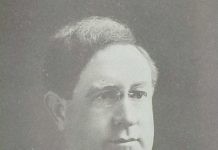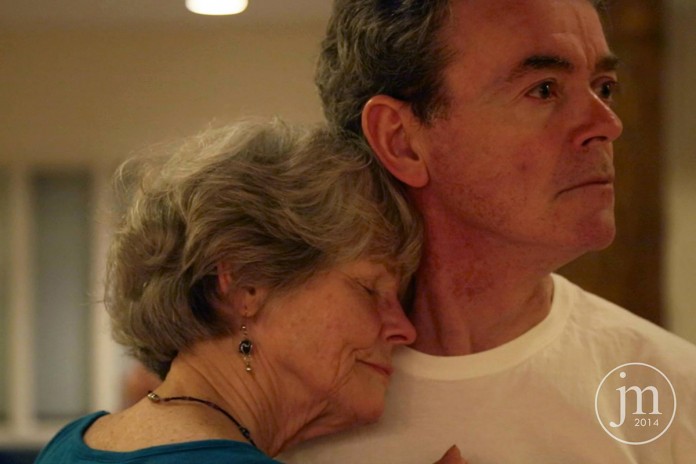Pickford Film Center’s film showcase, Dances for the Camera, is meant to bring meaningful live movement performance to a film-going audience. This collection of locally-filmed and produced shorts highlights a range of collaborative efforts between Bellingham Reperatory Dance, Kuntz and Company, and JmWorks that, through creative dance, sheds light on living and dying with Parkinson’s and Alzheimer’s diseases. Both diseases are incurable, progressive disorders related to aging of the nervous system, with Parkinson’s affecting movement and Alzheimer’s causing the depletion of memory and mental function, giving way to the most common form of dementia. Still poorly understood, these diseases affect the lives of the diagnosed as well as their loved ones and caregivers.
 World premiering in film format at the showcase is the short, “Ellis won’t be Dancing Today,” which was originally created as a live performance piece by Kuntz and Company for the Palliative Care Summer Institute Conference in July 2014. The work creatively portrays the experiences of one woman, Marilyn Flint, as she copes with the end of her husband, Ellis,’ life with Alzheimer’s.
World premiering in film format at the showcase is the short, “Ellis won’t be Dancing Today,” which was originally created as a live performance piece by Kuntz and Company for the Palliative Care Summer Institute Conference in July 2014. The work creatively portrays the experiences of one woman, Marilyn Flint, as she copes with the end of her husband, Ellis,’ life with Alzheimer’s.
Senior Instructor of Dance at Western Washington University’s Department of Theatre and Dance, Pam Kuntz (also of Kuntz and Company), specializes in bringing the life experiences of our community to the stage through collaborative movement and modern dance. Around 2012, she had been exploring the development of a piece focused on dementia but had not yet found the right community member to help shape and personalize the work.
That’s when she met Marilyn Flint and her husband, Ellis French.
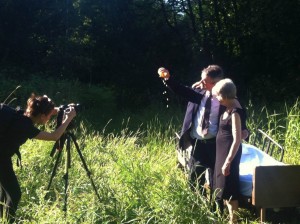
The three first met in 2012 at a caregiving event hosted by PeaceHealth. “Marilyn talked about how physical she and Ellis were in their dancing, even though he was living with Alzheimer’s. I thought that if I ever do anything in the future with dementia or Alzheimer’s, I would call her,” Kuntz explains. “About a year later in the fall of 2013, Marilyn sent me an e-mail that Ellis had passed away, and it was only about a month after that when the Palliative Care Institute invited me to develop a piece about an end of life journey. So I called Marilyn and we began developing the live performance right away that would share her story.”
Ellis and Marilyn met when they were in their mid-50’s at a dance in California, drawn together by their mutual love of teaching through music. They moved to Bellingham in 2007. “After he was diagnosed with Alzheimer’s in about 2009, we connected with Northwest Regional Council (NRC), who gives you help if you have a partner with Alzheimer’s,” Marilyn explains. “Caring for a loved one with Alzheimer’s can be very difficult. I was on duty for 24 hours a day for several years.”
The council connected Marilyn with Silverado Dementia Care Home (now called Bellingham Memory Care Community) as an adult day care provider. “Ellis was invited to come and play piano and dance as part of the entertainment program for Memory Care’s residents,” Marilyn says. Dementia and the medicines used to manage the degenerative disorder can dampen a person’s personality. “But Ellis’ piano playing — and our dancing — would get people up moving and smiling again,” Marilyn adds. “Ellis would say, ‘Having Alzheimer’s isn’t so bad if you can use it to help people.’ That was the essence of who he was.”
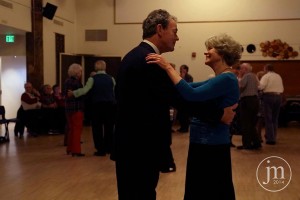
Ellis was able to live several years at home with Marilyn until it became too difficult for her to manage his care on her own. After moving to a care facility, he was placed on standard western Alzheimer’s medications and his health declined rapidly. Ellis passed away three weeks later at the age of 80.
“After seeing the live performance, many said that more people needed to see this piece,” Kuntz notes, “so we decided to make a different version for film that could go on and be shared more widely.” Kuntz had seen the film work of Juliette Machado of JmWorks while she was a student in one of Kuntz’ WWU classes. Impressed by Machado’s work, Kuntz invited her to help develop the film adaptation. Machado has filmed many weddings and theater and dance performances at WWU.
“Although the original performance was in a single location, for the film we chose to shoot in a number of different indoor and outdoor locations,” Machado explains. “We explored lapses in time and location and played with dialogue. We included new ideas that weren’t in the original piece that could only be done on film. It doesn’t fit into a typical film genre. It has a narrative arc, but I’ve been calling it a theater dance work for film. We consider it experimental, and it’s very unique,” she adds.
In the film adaptation, Marilyn plays herself and Jim Lortz, WWU’s professor of theatre, portrays Ellis. The phenomenally talented actor also happens to be diagnosed with Parkinson’s disease.
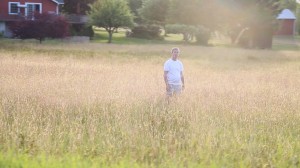
“Although this piece is about Marilyn’s life with Ellis’ Alzheimer’s, it’s really much bigger than that,” Kuntz says. “My work is rarely literal. This piece opens more possibilities for people to put themselves inside the story. We use symbols to show the shifting and changing experiences of life with Alzheimer’s, the loss of layers of memory, the hard work of caregiving, the change in vitality. It’s about aging and dying, caregiving, loss, and love.”
The future of “Ellis won’t be Dancing Today” is uncertain but hopeful. “We’re considering entering it the film festival circuit, possibly in the experimental category,” Machado says. “And it will definitely become available on YouTube to Alzheimer’s support groups, conferences, and to physicians and caregivers,” Kuntz adds.
Two other short films will share Pickford’s showcase. “Parkinson’s Dreams About Me” features an intermingling of dance and interview excerpts by community member Rick Hermann, who has lived with Parkinson’s for more than 20 years. Overlaid by an original cello score, this Kuntz and Company collaboration highlights the therapeutic benefits of dance for people suffering from neurological disorders. Kuntz had developed the piece as an off-shoot of the dance classes she’s been offering to people suffering from Parkinson’s, supported in part by generous fundraising by Pickford Film Center. It won Best Experimental Film at the Oregon Independent Film Festival in 2012.
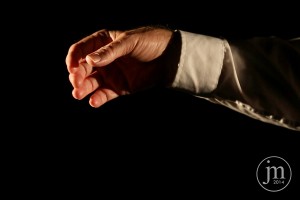
The third dance film, “Pacing,” was produced by JmWorks in collaboration with Bellingham Repertory Dance. “The movement is very rhythmic and tied to the score, which is made up of sounds captured on set that I manipulated in edit,” Machado describes. This short film was screened at the 40 North Dance Film Festival in San Diego in July 2015, and at the New Jersey Outlet Dance Project Festival in October 2015.
“Dances for the Camera” will premiere at the Pickford Film Center on January 10. A pre-screening reception with the filmmakers and collaborators will begin at 1:30 p.m. followed by a 2:30 p.m. showing.
Pickford Film Center
1318 Bay Street
Bellingham, WA 98225
360-738-0735
www.pickfordfilmcenter.org
Dances for the Camera Facebook Event:
https://www.facebook.com/events/932871293454150/






